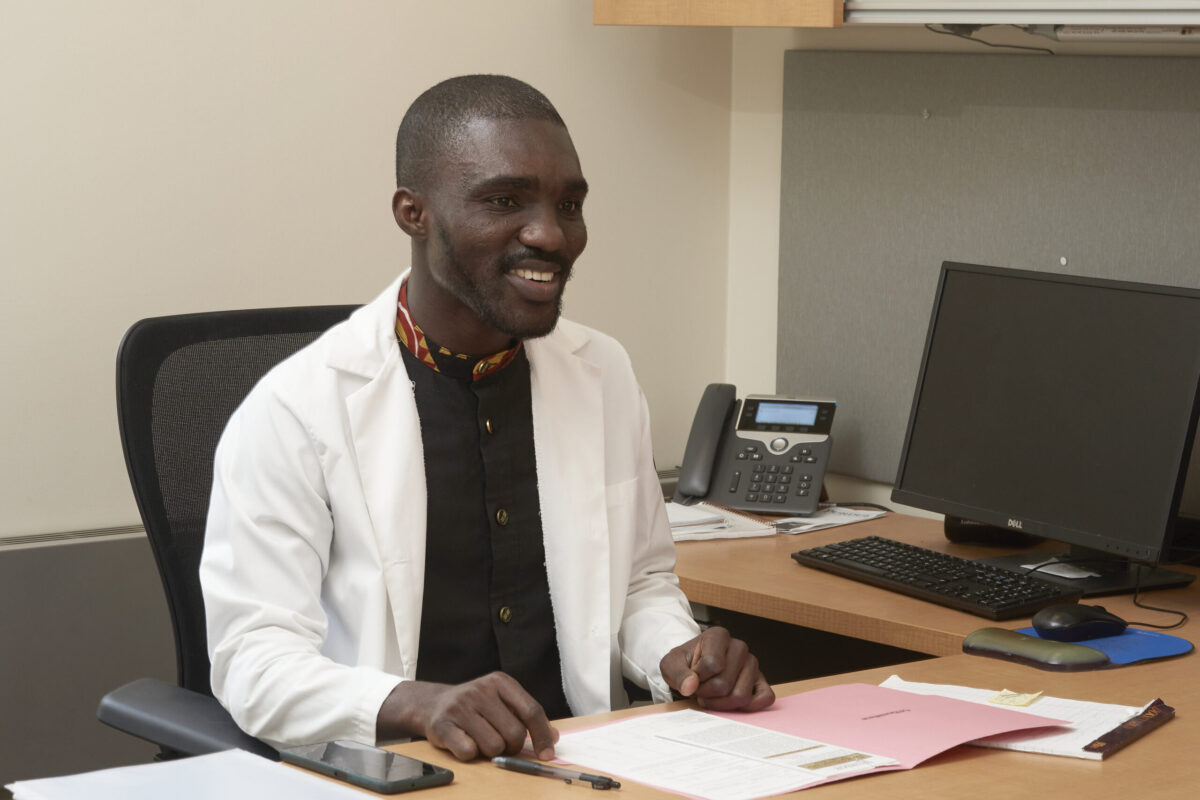Nursing PhD student advances research in palliative care and financial decision-making
Written By: Rebecca Hoffa, rhoffa@purdue.edu

Evans Appiah Osei
Purdue University School of Nursing PhD student Evans Appiah Osei has seen firsthand the challenges women with cervical cancer face in his home country of Ghana, where palliative care and regular screening is uncommon.
Osei brings to Purdue’s College of Health and Human Sciences a wealth of research experience exploring care for women with cervical cancer from his master’s studies at the University of Ghana. As he pursues his PhD, he plans to build upon his research portfolio to explore the financial implications related to end-of-life decision-making in women with cervical and other gynecological cancers.
“(Patients) will not really focus on that because they think they already have insurance and that their insurance will cover (the cost),” Osei said. “I would like to explore the situation to see whether they face challenges, even if they have insurance. Even if it covers their treatment, they have to buy food; they have to take care of their children and have to pay their bills. After we explore, because little is done in (end-of-life decision-making), especially with financial decision-making, we can maybe develop an intervention to see how best we can relieve these women of financial stress and then how we can improve their quality of life.”
Osei first became interested in this area of research when he stumbled upon cervical cancer in his reading and hadn’t heard much about it previously. Upon interviewing others in Ghana, he realized the knowledge about cervical health was scarce. After taking on the research topic, he discovered cervical cancers were often initially treated with antibiotics as if they were another infection, which caused the cancer to evade detection until a later stage when the disease had progressed too far or metastasized to other areas of the body. This often resulted in psychological trauma, among other challenges, for patients.
“My previous research revealed new knowledge in Ghana about cervical cancer and cervical cancer screening,” Osei said, who has co-authored six publications on cervical cancer and cervical cancer screening. “One of my studies revealed that less than 2% of the women I did the study among had undergone cervical cancer screenings.”
When he was exploring PhD opportunities in the United States, he connected with Assistant Professor Jiayun Xu, whose research explores palliative care and advance care planning for individuals with Parkinson’s disease. Osei credits Xu’s guidance with helping him grow as a researcher.
“Evans is highly motivated to improve financial decision-making for women with gynecological cancers,” Xu said. “He is driven by his experience seeing women and their families become bankrupt after end-stage cancer treatments. He is learning a lot as a dual nursing-gerontology PhD student, and we are excited to continue developing his dissertation to address financial decisions in cancer.”
While at Purdue, Osei has already expanded his understanding of quantitative research and statistics, which has allowed him to connect his research to other areas, such as industrial engineering, that also explore decision-making.
“We’re starting to infuse the nursing lens into research that’s happening outside of the School of Nursing, which is really great to see, especially when dealing with healthcare challenges and a complicated healthcare system,” said Libby Richards, director of Purdue’s nursing PhD program. “Nurses have a different lens of how they look at things, and so it’s a unique contribution to research happening (not only) within the school but also outside of the school.”
While Osei is wrapping up his first year in the nursing PhD program, he noted that the caliber of education he’s received so far has been extremely beneficial in helping him pave his way toward a career in academia, where he can not only continue his research but also train future generations of nurses.
“They are really preparing us to be the best researchers,” Osei said. “I know Purdue is among the best in the U.S., so they are teaching us how to understand theories in nursing and to be able to apply the theories to practice.”
Ultimately, Osei hopes to see his research and advocacy make a difference in palliative care for individuals in the United States and in developing countries, helping them to approach the end of life as comfortably as possible — financially, physically and emotionally.
“People will focus on pursuing their education, marriage, helping their children succeed, but planning for the end of life is something that people don’t really focus on,” Osei said. “It’s one of the most important aspects because everybody will get to that end, so I want to do more research in that to help people make advance care plans, especially those with chronic conditions.”
Discover more from News | College of Health and Human Sciences
Subscribe to get the latest posts sent to your email.